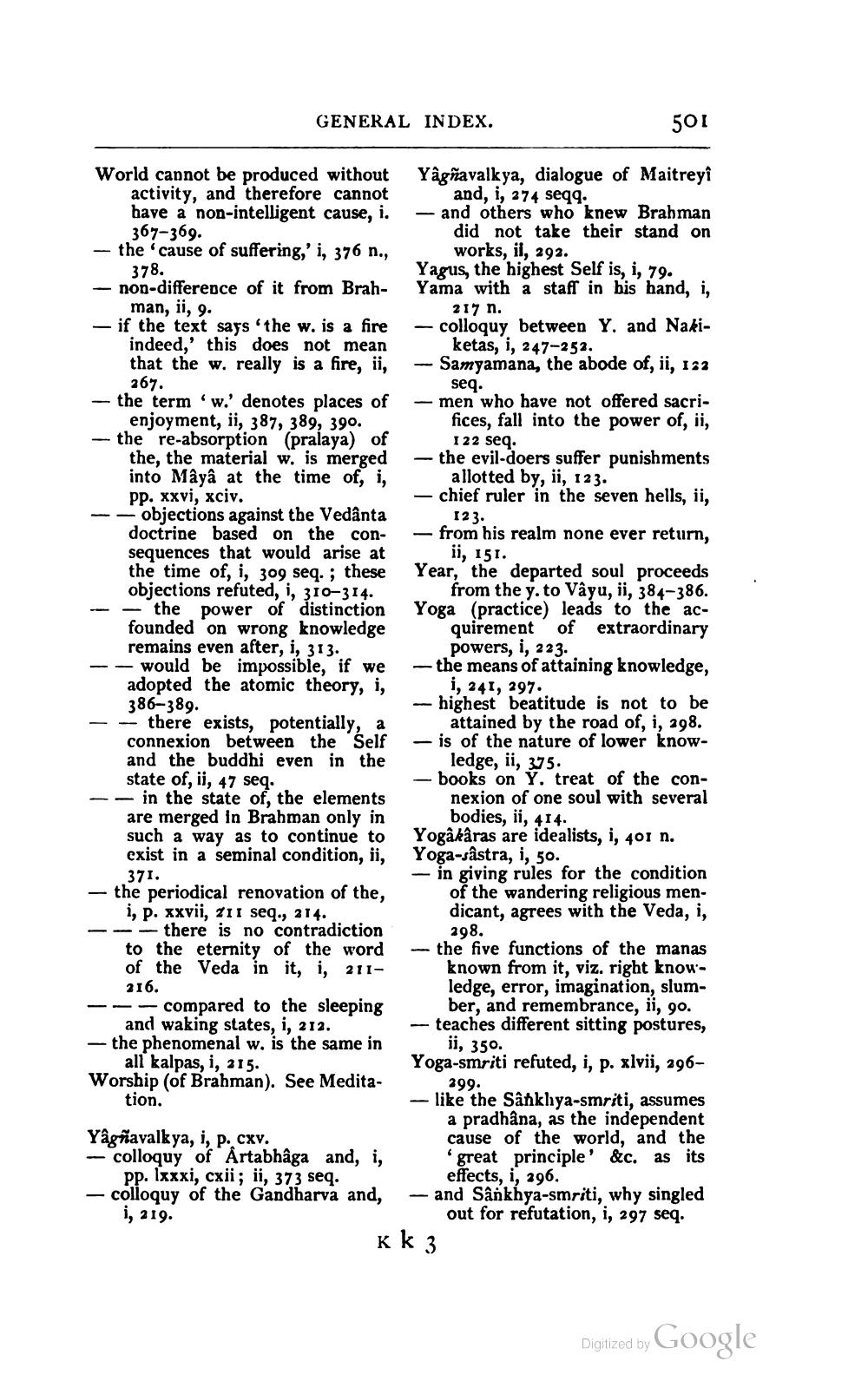________________
World cannot be produced without activity, and therefore cannot have a non-intelligent cause, i. 367-369.
the 'cause of suffering,' i, 376 n., 378.
non-difference of it from Brahman, ii, 9. - if the text says 'the w. is a fire indeed,' this does not mean that the w. really is a fire, ii, 267.
GENERAL INDEX.
the term 'w.' denotes places of enjoyment, ii, 387, 389, 390. -the re-absorption (pralaya) of the, the material w. is merged into Mâyâ at the time of, i, pp. xxvi, xciv.
objections against the Vedanta doctrine based on the consequences that would arise at the time of, i, 309 seq.; these objections refuted, i, 310-314.
the power of distinction founded on wrong knowledge remains even after, i, 313. --would be impossible, if we adopted the atomic theory, i, 386-389.
there exists, potentially, a connexion between the Self and the buddhi even in the state of, ii, 47 seq.
in the state of, the elements are merged in Brahman only in such a way as to continue to exist in a seminal condition, ii, 371.
——
the periodical renovation of the, i, p. xxvii, z11 seq., 214.
there is no contradiction to the eternity of the word of the Veda in it, i, 211216.
compared to the sleeping and waking states, i, 212. -the phenomenal w. is the same in all kalpas, i, 215.
Worship (of Brahman). See Meditation.
-
Yagnavalkya, i, p. cxv.
colloquy of Artabhâga and, i, pp. lxxxi, cxii; ii, 373 seq. colloquy of the Gandharva and,
i, 219.
501
Yagnavalkya, dialogue of Maitreyî and, i, 274 seqq.
and others who knew Brahman did not take their stand on works, il, 292.
Yagus, the highest Self is, i, 79. Yama with a staff in his hand, i,
—
217 n.
colloquy between Y. and Nakiketas, i, 247-252.
-
- Samyamana, the abode of, ii, 122 seq.
- men who have not offered sacrifices, fall into the power of, ii, 122 seq.
-the evil-doers suffer punishments allotted by, ii, 123. -chief ruler in the seven hells, ii,
-
123.
- from his realm none ever return, ii, 151.
Year, the departed soul proceeds from the y. to Vâyu, ii, 384-386. Yoga (practice) leads to the acquirement of extraordinary powers, i, 223. -the means of attaining knowledge, i, 241, 297.
highest beatitude is not to be attained by the road of, i, 298. - is of the nature of lower knowledge, ii, 375.
- books on Y. treat of the connexion of one soul with several bodies, ii, 414. Yogâkâras are idealists, i, 401 n. Yoga-sâstra, i, 50.
in giving rules for the condition of the wandering religious mendicant, agrees with the Veda, i, 298.
-
the five functions of the manas known from it, viz. right knowledge, error, imagination, slumber, and remembrance, ii, 90. teaches different sitting postures, ii, 350. Yoga-smriti refuted, i, p. xlvii, 296
299.
---
like the Sânkhya-smriti, assumes a pradhâna, as the independent cause of the world, and the 'great principle' &c. as its effects, i, 296.
- and Sankhya-smriti, why singled out for refutation, i, 297 seq.
Kk 3
Google
Digitized by




